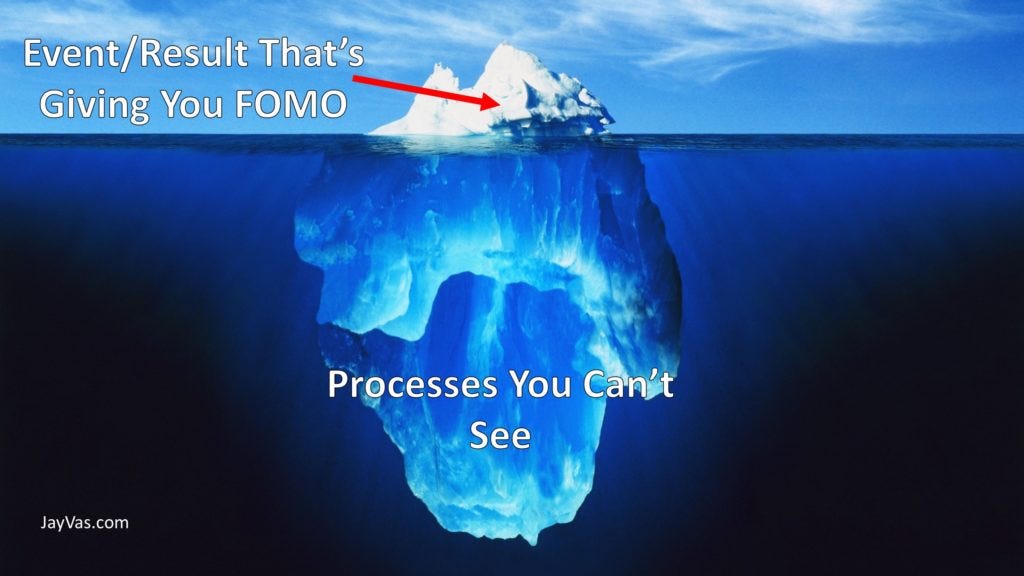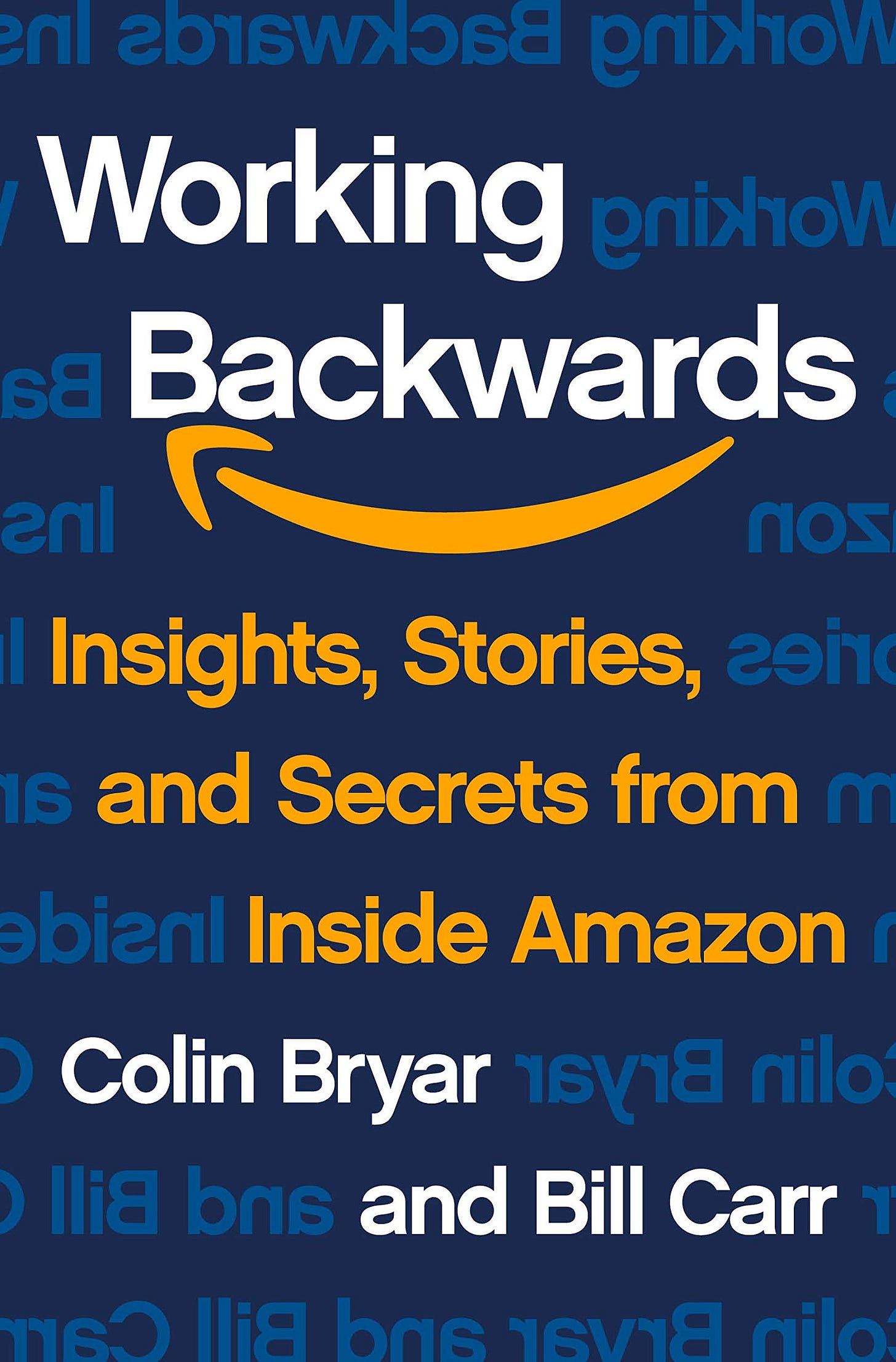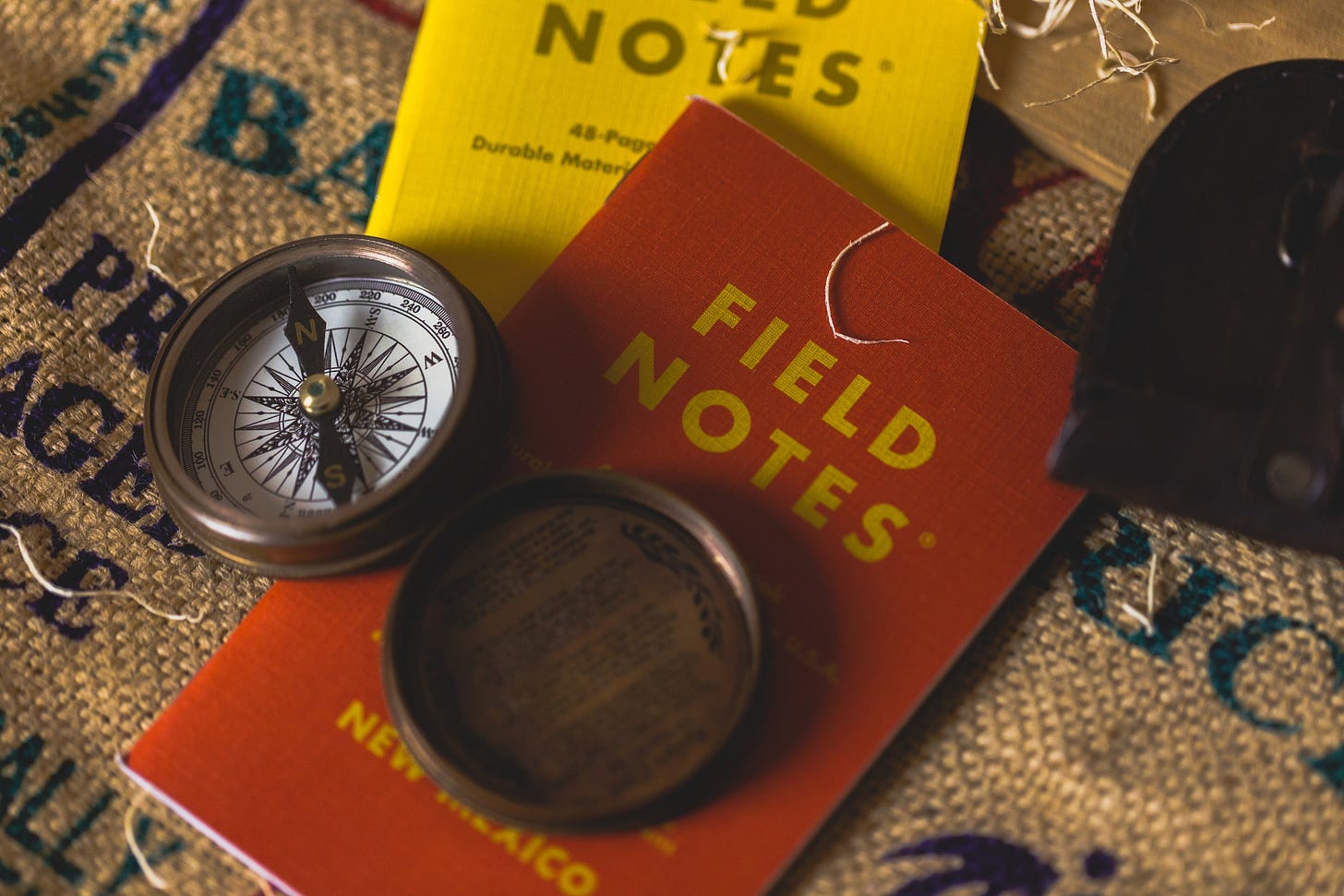FOMO, Amazon's Working Principles, Note-taking, and Walmart's strengths
In which I explore how Walmart can succeed in large categories
Hey everyone,
Greetings from Washington, D.C.!
Spring is around the corner and I’m trying to squeeze the last few weekends of work before we are all out and about getting vaccine appointments. It’s always the last stretch that requires the most patience.
I’ve had quite a bit of FOMO recently because of some of my friends living a nomad lifestyle and this piece from Jay Vasantharajah found me at the right time—it emphasizes that I haven’t seen the process behind what they did or the unique circumstances and privileges they have to enable this.
Very, very sobering and I found myself applying it to different areas of my life over the last week. I highly encourage you to read it.
With that out of the way, in this issue of Snapshots, I want to explore:
A first look at Working Backwards
Justifying my Field Notes obsession with science
Why Walmart should double down on strengths (from the archives)
Open Protocols, NYC in neo-noir, and a 250 year-old restaurant
Book of the week
Much has been written about Amazon’s six-page memos, the “two pizza” rule, and the “Day One” mentality. I have covered it here on this newsletter a few times as well. That comes as no surprise—Jeff Bezos has built the largest industrial juggernaut since the times of Rockefeller, Carnegie, and Vanderbilt.
So it is also no surprise that when we get even a tiny glimpse of what it’s like to work there, everyone scrambles to find things that they can adopt themselves. So when two ex-executives at Amazon write a book specifically on the principles that the company uses internally, it get one hell of a tailwind.
That’s where Working Backwards from Colin Bryar and Bill Carr finds itself. While I want to save my broader commentary on the book for next week, I do want to share some of the things I found particularly interesting:
On understanding the principles that guide Jeff Bezos’ decisions when Colin was his Chief of Staff:
I worked with him during his regular office hours from ten in the morning to seven in the evening. Most days entailed between five and seven meetings with product or executive teams. Before and after Jeff’s office hours I worked with those teams to help them prepare for their interactions with him so they’d be more productive for everyone. I already knew what it was like to be on the receiving end of an endless flood of ideas from him and then be asked to accomplish things quickly and with standards that could seem unreasonably high. I was often asked, “How do you think Jeff will respond to this idea?” My standard answer was, “I can’t predict what he’ll say, but these are the principles that typically inform his response.…”
This made me think: What are my guiding principles? What are the guiding principles of the people I interact with on a regular basis? What are the optimizing for? To what extent can I predict how they would react to a given piece of information?
On creating new businesses:
Jeff often used an analogy in those days when describing our efforts to innovate and build new businesses. “We need to plant many seeds,” he would say, “because we don’t know which one of those seeds will grow into a mighty oak.” It was an apt analogy. The oak is one of the sturdiest and longest-living trees in the forest. Each tree produces thousands of acorns for every one tree that eventually rises to the sky.
Exceeding customer expectations by underpromising:
Another of Jeff’s frequent exhortations to his small staff was that Amazon should always underpromise and overdeliver, to ensure that customer expectations were exceeded. One example of this principle was that the website clearly described standard shipping as U.S. Postal Service First-Class Mail. In actuality, all these shipments were sent by Priority Mail—a far more expensive option that guaranteed delivery within two to three business days anywhere in the United States. This was called out as a complimentary upgrade in the shipment-confirmation email. Thank-you emails for the upgrade included one that read, “You guys R going to make a billion dollars.” When Jeff saw it he roared with laughter, then printed a copy to take back to his office.
On cooperation between departments and :
Many companies set entirely independent goals for key players at every level. All too often this gives rise to infighting, information withholding, and hoarding of resources, as each leader is incentivized to undermine the other. Amazon’s compensation is, by contrast, simple and oriented toward the long term. As one is promoted at Amazon, the ratio of cash to equity compensation becomes more and more skewed toward long-term equity. The Frugality leadership principle makes the reason very plain: “There are no extra points for headcount, budget size, or expense.”
This reminded me of one of the other books recently featured in this section, The People’s Republic of Walmart, which outlined the danger of internal competition using anecdotes of the Sears corporation.
There’s a lot more to come next week—including the famous “Bar Raiser” standard and the memos—stay tuned.
Quick question: If you’re reading this book right now, what have been your favorite parts?
Long read of the week
Note Taking, Review, Memory, and Comprehension
Speaking of note-taking, one of my favorite consumer brands is Field Notes. Their ubiquitous 3.5" by 5.5" notebooks have dotted every workspace I have used in the last 5 years. And they have a tagline that I’ve taken for granted so far:
I’m not writing it down to remember it later, I’m writing it down to remember it now
So, this week I scraped the underbelly of the internet to find a paper that proved this point. And I did!
Note Taking, Review, Memory, and Comprehension by Mark Bohay, Daniel P. Blakely, Andrea K. Tamplin and Gabriel A. Radvansky had the following conclusions:
This study confirmed that note taking does aid performance.
Although there may be some benefit of reviewing notes, it did not have a profound effect, at least in the context of the current study.
Our analysis suggests that more note taking provides a later per- formance benefit. However, the evidence of such benefits was weak and inconsistent. Thus, at least under the circumstances used here, it seems that to improve test performance, it is of primary importance that a person be actively attending to the material by taking notes, but the amount of information noted is of secondary importance.
I’m glad my purchases are at least somewhat backed up by science!
Business move of the week
Editor’s note: This is a re-post from the 12th July, 2020 edition of Snapshots. I have been thinking about how Walmart and other legacy retailers can find niches to succeed that are large enough to make it worthwhile. One of the areas that they have been killing it in is groceries using their stores and their micro-fulfillment centers. Their move to buy a stake in TikTok was indicative of the company’s ambitions to own the next wave of commerce—social commerce. The hiring of Goldman Sachs’ head of the customer division is another indicator that they want to build the next wave of hit products by building on their core strengths.
They remind me of Microsoft while Apple was running away with the mobile platform in the late 2000s. If Microsoft had made better moves back then, it would be a radically different company today.
This piece from last summer captured some similar thoughts around Walmart+:
If you were to look back through the issues of Snapshots over the last year, you’ll find two themes that come up frequently:
Businesses should focus on their strengths
Every strength will have a corresponding weakness.
This move by Walmart to have drive-in theaters in its parking lots would be exhibit A for these themes.
Walmart sees Amazon in the rear view mirror with its monopolistic stronghold on online retail. It’s unsuccessfully tried to pump up its e-commerce business line through acquisitions like Jet.com. What it needs to do is to leverage its strengths.
One of those strengths? 90% percent of Americans live within 10 miles of a Walmart store. Another strength? Walmart is known for its expansive open parking lots.
Combine these strengths with the implosion of movie theaters because of COVID-19 and a ting of nostalgia for the good old days, and you’ve got a perfect lead generation tool for Walmart that cannot be replicated by Amazon. People who come to watch would likely be willing to increase some of their spending at Walmart if they are going to go to the parking lot anyways.
An idea to take this further? Add unlimited drive-in privileges to the upcoming Walmart+ service. It’s like a niche MoviePass-like offering, but with a real mechanism to make money through shoppers buying things at Walmart. A mechanism that doesn’t try to replicate Amazon’s streaming services but tries to leverage Walmart’s unique strengths.
I would love to hear any thoughts or anecdotes around how Walmart and other incumbents can craft successful niches by using their existing businesses. Just reply to this email.
Odds and ends of the week
A perfect mix of mediums this week. An article, some photos, and a video:
The Golden Age of Open Protocols: The internet is built on open protocol. These protocols allow applications to operate on top of other applications. Think how an email client like Superhuman or Apple’s Mail app can operate on top of your Gmail account. This short memo by Fred Wilson, one of the Godfathers of current venture capital space, outlines an alternative world where companies has protocol-based business models. It’s reminiscent of what Apple is trying to do with their new privacy settings—trying to make sure that they own any protocols that gets to interact with an iOS device.
Photographer Wander NYC Streets to reveal Neo-noir: Just gorgeous stuff. I think you should just click the link and see the photographs yourself.
One Japanese Restaurant, One Dish, 250 years: I’ve been thinking about the general concept of “survival is winning.” If you can stay in the game long enough, good things will happen. And there might not be a better example that this restaurant in Japan which have been serving one dish—Oyakodon (chicken and eggs)—for multiple centuries. It also happens to include a heartwarming story about a couple who had their first date at this restaurant!
That wraps up this week’s newsletter. You can check out the previous issues here.
If you want to discuss any of the ideas mentioned above or have any books/papers/links you think would be interesting to share on a future edition of Sunday Snapshots, please reach out to me by replying to this email or sending me a direct message on Twitter at @sidharthajha.
Until next Sunday,
Sid



